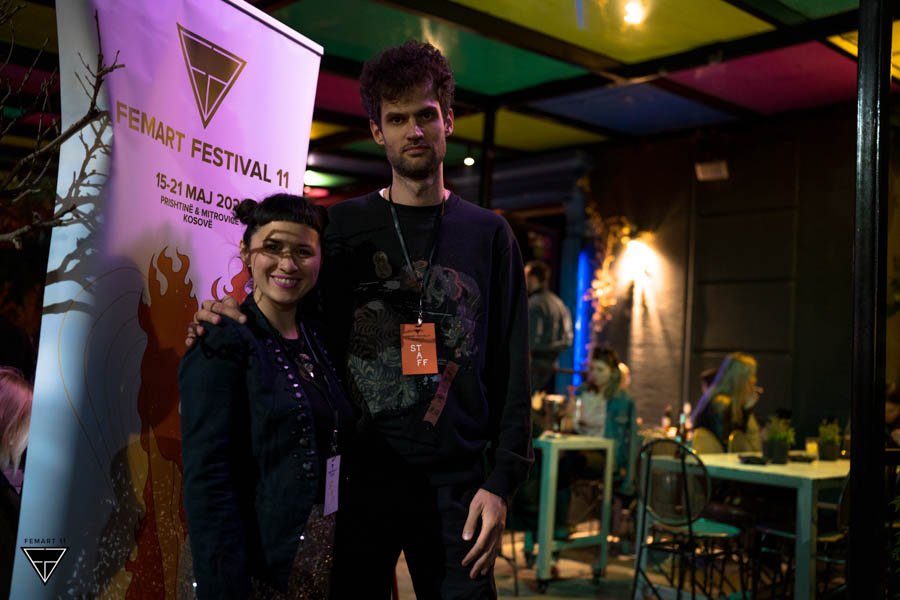By Romain Taunais and Ivana Bilić
On the fifth day of the FemArt Festival in Prishtina, we had the opportunity to see two theater plays, one from Kosovo, and one from Poland. We’re bringing short reviews of these plays, both on the urge to scream for change.
Danny and the Deep Blue Sea
The Bronx, New York. Two wooden chairs in an empty bar. A bed. A mattress, to be precise. Two damaged, marginalized individuals. Danny, a raging working man, has difficulty controlling himself. Roberta, a young mother living at her parents’, her dad suspected of incest, spends her nights out searching for herself. Late at night, the two meet in a bar. From what could appear to be an impossible relationship between two self-destructive humans incapable of loving, they approach each other with fear, and yet, from bitter arguments to tender moments of love, they manage to speak out about their past in order to reveal themselves to one another. Burning their fear, as hard as it is, is the only way for them to search for attentiveness, for attention: to search for love.
The 1980’s play from John Patrick Shanley still resonates today. Here, Ana Bateva, the director, managed to magnify the acting with minimal staging and lighting. She preferred putting all the attention and agency on the actors. Full of movements, action, and rhythm, the body language, even for non-Albanian speakers, speaks for itself and transmits emotions and the essence of the play. The two individuals start fighting at first, but then in their quarrels somehow find understanding and tenderness. In their corporal expressions, there is a lot of violence, despair, and anxiety; at one point they are strangling each other. The director of the play considers Roberta very powerful. She was not afraid to go ahead and face all her problems and say them all out loud. So, in a certain way, she was indeed burning her fear away.
“Woman and Life” – You will not walk alone
In October 2020 in Poland, mass anti-governmental protests started. The Law on Abortion was so tightened that it made abortion illegal in almost all cases. That provoked fury in Polish society and the protests, also called Women’s Strike, were raging for several months. But just like all other protests, they faded away with time, anger no longer being as strong as it once was, everyone and everything becoming quieter. Until the next ones. In the protest-like performance, the Polish play “Woman and Life”, directed by Piotr Łukaszczyk, denounces the conservative discourse in Poland, yelling and shouting out of resentment and anger.
The play itself is unquestionably singular. To a rhythm of techno music, punctuated by songs and satirical interludes, the play, orchestrated almost like a concert, underlines the absurdity of conservative Polish rhetoric. When asked what “Woman and life” is about, the director said that it is a play that tells the story of an ordinary Polish woman from her birth to the moment she gives birth and her relationship with her family, her partners, her work, and with society. It depicts a conservative society, as Łukaszczyk asserts: “where lots of women are scared to tell or just decide what to do with their lives, what to do with their bodies, what to do with their education, with their future” – a society where men decide for women. The director stressed that despite Poland being a democracy, it does not offer the same rights to men and women: “It is a reflection of the whole Polish community.” From what he could see in Kosovo while speaking with some people, he realized it might be a reflection of the Kosovar community as well. As we saw for ourselves tonight at the Oda Theater, it is an even larger universal reflection. “This is a story about a woman who is one of the hundreds of thousands of women who try to burn their fear,” Łukaszczyk concluded.
Ironic from the beginning to the end, the play uses conservative speech as text to underline its absurdity. The stage, minimalist, free from decor, with only a DJ on the side, puts the focus on the actors. The great collective of actors acts as one giant organism speaking, moving, dancing, and acting in perfect unison. There is a collective narration. In an interview for the Wroclaw Cultural Guide, in October 2021, the director said: “The protagonist is collective and this is a woman.” It is one woman and all women, the whole of society. The play breaks the fourth wall and interacts with its audience, with the community. They challenge them, they establish contact or dialogue with them. Through an endless list of sexist clichés, the play makes us comprehend beyond the absurdity of the speech, a multitude of societal biases strongly anchored in our habits and customs. It even gets to the point where you feel highly uncomfortable sitting in the audience and being almost under attack with these sexist, patriarchal, conservative slogans.
The modern rhythm, as if we were in a minimal techno discotheque, contrasts with the retrograde speech, giving it a rigid tone through a quick regular tempo, emphasizing its inhumanity. In the above-mentioned interview with Kamil Bujny, Piotr Łukaszczyk compares the punk music with the anger of the protesters, which culminates in a special street energy that pulses as a whole and commits to the most basic, fundamental rights. A sense of community is created and the play concludes on a positive note with the sentence “You will not walk alone” – applauded by the audience who were clearly deeply moved.

